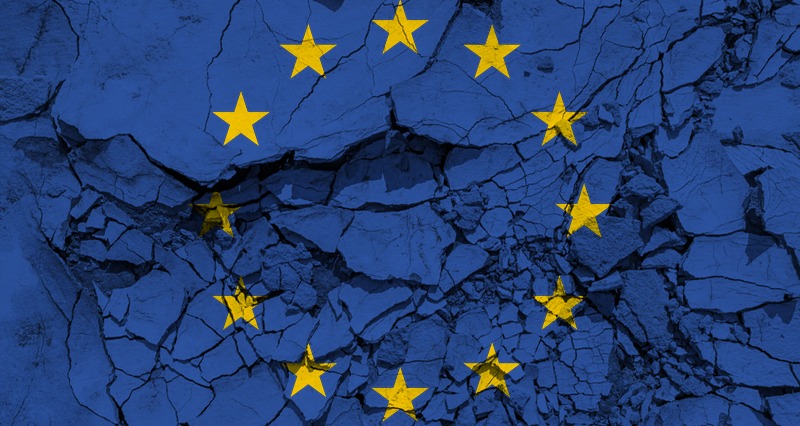The European Union is on the verge of fundamental changes… recent turmoil in the European People’s Party (EPP), the largest voting block in the European Parliament, spells the doom of the establishment and opens the door for vibrant popular forces to take the throne. Vávra Suk, the editor of Swedish weekly Nya Tider, explains why.
The quarrel over Hungarian ruling party Fidesz’ membership in the EPP is perhaps the best example of the group’s worsening inner tensions. The EPP is officially a conservative and Christian Democrat group, though it generally strays toward the center. In contrast to most of the other parties, Fidesz is conservative, Christian and democratic in a populist sense. The majority of others in the group have neoliberal and globalist viewpoints.
”We will not let the populists destroy our Europe”, @ManfredWeber
during #EurovisionDebate ???????? #TellEurope #ThePowerOfWE #EUDebate pic.twitter.com/nA6AVG4r5j— EPP (@EPP) May 15, 2019
This is especially true for the Swedish members, as Sweden’s viewpoints stand directly opposed to those of Fidesz. The Swedish “conservative” Moderate party has been one of the driving forces to expel Fidesz out of the group. On February 22, party leader Ulf Kristersson spoke with the Swedish news agency TT about Fidesz:
− They don’t seem to be leaving voluntarily and they apparently won’t change their opinion on fundamental issues. In this case, we don’t see any alternative other than to expel them.
The Swedish Christian Democrat party has also expressed a desire to expel the Hungarians.
This is the line of demarcation between the globalists and the nationalists. One example of these fundamental differences would be the Hungarian constitution parliament adopted in 2011 which is an extremely provocative document for liberals. The sub-heading reads “God save the Hungarian nation,” already heresy against the EU’s so-called fundamental values on two counts: the reference to the Christian God, and to the concept of the nation.
The constitution also defines marriage exclusively as between a man and a woman, even if the so-called partnership is allowed. Families with many children are rewarded economically. This is in total confrontation with the liberal agenda, which promotes LGBT values in Europe and threatens European demographics with migration.
When the constitution was first adopted, Werner Hoyer, at that time Minister of State at the German Federal Foreign Office, warned that the document violates the fundamental values of the European Union. Note that this was during the rule of Angela Merkel, whose party CDU calls itself Christian Democrat and is a member of the EPP.
From where do these anti-family, anti-religious, and anti-national emanate? The real power of the European Union is concentrated in the Commission and its president Jean-Claude Junker. Junker is also a member of the EPP through his little Luxemburg Christian Social People’s Party, and it was the EPP who promoted him as their candidate for president of the European Commission.
And it is Junker who Hungary’s Prime Minister Viktor Orbán blames for the problems in the European Union such as those related to a recent poster campaign which the EPP attempted to stop and even demanded Orbán apologize for. On the posters, Junker is pictured together with the globalist billionaire George Soros, along with the message that Junker is the errand boy of Soros.
Oh.. I thought CEU was a red line for #EPP #EPPGroup? Now anti-EU/Junker/Soros posters are the “new red line”? How many red lines does EPP have for #Orban #O1G? What’s the next red line for EPP? https://t.co/WGcCTlU4Qb
— Michael LaBelle (@MikeEnergy) March 5, 2019

The Hungarian campaign, launched in February, suggests that the migration policies of Brussels are a threat to the security of Hungary. “You also have a right to know what Brussels plans!” the poster says, and continues: “They want to introduce compulsory settlement quotas. They want to weaken the member state’s abilities to protect their own border. They want to facilitate immigration through migrant visa”.
Of course, Orbán did not apologize. In fact, it is the other parties that should thank Orbán for stopping the migrant influx at his border, so that the German CDU/CSU ruling party can continue to pretend to be humane without having to be confronted with the full impact of the devastating effects of their policies. But the conflict inside the EPP is taking place on a deeper level.
When I was interviewed on the radio channel Sputnik, they assumed that the main point of conflict was related to migration… I explained that it is much more than that. Orbán is pointing out the driving forces behind the globalist agenda, exposing its exploitational financial system as well as how the mainstream media has manipulated public opinion. Migration plays only a minor part, or to be exact, is only a tool for other ends.
It is critical to understand that a handful of people own the majority of the wealth in the world. In the store, you see different brands, but if you read the text on the package, you will find out that all of these are part of one virtual monopoly that also sells the “competing” brands. Remember this when you hear talk about the “free market.”
It is from this perspective that Fidesz’ actions should be viewed, which also explains the fanatic hate they get from the globalists. To mention two more important actions carried out by the party, Fidesz put the central bank of Hungary under the control of the people through parliamentary action and placed controls on the media to force them to report in an unbiased manner. These two measures were met with an outcry, and we can immediately see why the issues are so sensitive.
At the current juncture, the EPP loses no matter what they do. They can’t allow Fidesz to remain in the group since it would tear it apart from the inside. Meanwhile, it is clear that Fidesz will not only defend their position, they also have ambitions to turn the ideological direction of the entire EPP. On the other hand, expelling Fidesz will strengthen the alternatives that the party could join instead. Fidesz has already been in contact with Marine Le Pen’s party Rassemblement National.
If a European ruling party joined forces with dissidents in France, Germany, Sweden, and other countries, it would create a political force so powerful it is difficult for us to comprehend in advance. It could prove to the European electorate that there is a real political alternative, that these groups are not just some fringe parties as they are portrayed in the press.
In Sweden, the Liberals made the parliamentary elections in September into a general question about the Union… this turned into a complete fiasco, and the Liberal party was nearly annihilated. Now, many establishment parties want to make the “integration” of the Union, in effect creating a United States of Europe, their main topic of interest. This idea does not only come from liberal parties, but also from the social democrats. At a European social democrats’ conference on February 23rd in Madrid, the social democratic Prime Minister of Sweden, Stefan Löfven, said that there was a “paramount objective” is to stop the “populist and right-wing extremist” parties who want to stop the centralization of the EU. He wants to use the same method that he used in Sweden to keep the anti-establishment Swedish Democrats from power, ie cooperating with the liberals.
The prospect of Fidesz joining an existing group is not the most frightening outcome imaginable for the globalists, however. Imagine if Fidesz instead created a new group, dragging in genuinely Christian and Conservative parties from across Europe. Together with the group that Matteo Salvini of Italy’s Lega is forming with other Eurosceptic forces, they could end up the largest force in the European Parliament after May 26th.
The anti-establishment parties are already a powerful force in Europe. The Swedish liberal think tank Timbro conducted a survey this February that showed that so-called “populist” parties enjoy huge public support. According to Timbro, they are twice as big as the liberal parties in Europe and equal in size with the social democrat parties. In the national elections, one in four Europeans, or 26.8 percent, voted for a “populist” alternative. The researcher behind Timbro’s report, Andreas Johansson Heinö, writes that this spells “a historical shift” for Europe.
If Salvini’s new group could join forces with Orbán’s Christian Democrats, united around the concept of cooperation between free national states instead of a European Superstate, Heinös nightmare could become a reality.

















Leave a Reply